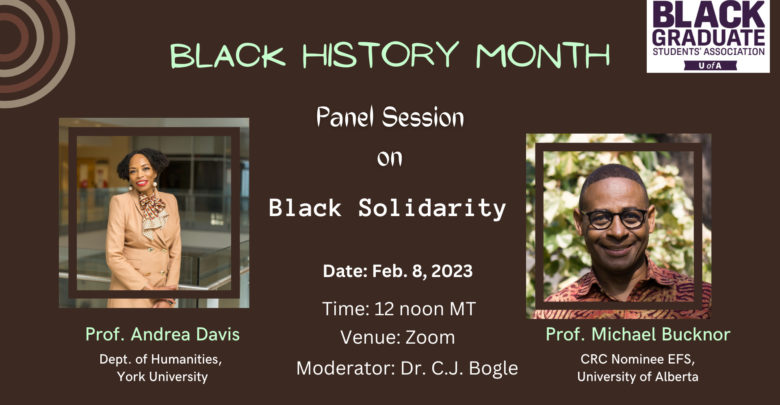Panelists discuss Black solidarity for Black History month
“It’s not just their struggle, its our struggle” panelist says, during a panel hosted by the Black Graduate Students Association.
 Supplied
SuppliedAndrea Davis, from York University’s department of humanities, and Michael Bucknor, from the University of Alberta’s department of English and film studies, were featured speakers on a panel hosted by the Black Graduate Students’ Association (BGSA), with both individually presenting on Black solidarity, a form of unity between African-American peoples to aid in advocacy for racial rights and freedoms.
During the panel on February 8, Davis discussed her novel, Horizon, Sea, Sound: Caribbean and African Women’s Cultural Critiques of Nation, and the implications of co-resistance. Bucknor followed, presenting on Barbadian-Canadian writer, Austin Clarke‘s life and work of “chipping away the walls of division.”
In her book, Horizon, Sea, Sound, Davis used the idea of the horizon as a representation of both the “opening and limiting” of racialized women’s opportunities, as well as the contradiction between hope and loss. The novel continues in the idea of the sea’s sound, as Davis explores her own journey from the Caribbean to Canada.
“The problem with the horizon is that in every case, it’s a mirage. As you approach it, it recedes … its promise is a lie.”
Davis attributes the question of the novel to exploring “refus[ing] these forms of competitive belonging.” In the ideas of sea and sound, and their roles in history and memory, namely in the changes of the sounds from the Caribbean sea to the Toronto cityscape.
Davis wrapped up her presentation on the importance to “live in the future, now.”
“[It’s] not about arriving at some perfect final point, rather, that each configuration of the present remains liveable.”
“[Clarke was] the first African-Canadian writer to publish in English,” Bucknor said.
Bucknor described his study of Austin Clarke as highlighting the importance of Black solidarity in “countering vulnerabilities caused by racial capitalism.”
Bucknor attributes the power of “intimacy [within] Black artistic friendships, [to] uncover innovative creative-practices.” He then questioned if this same power of intimacy can “extend to allies of a different race.”
Clarke moved to Canada in 1955, but would publish his first novel, The Survivors of the Crossing, just nine years later. Going on to write several more novels and short story collections, Clarke would become known as “Canada’s first multicultural writer” before his passing in 2016.
Clarke, via his roles in media, his novels, interviews, or on television became a spokesperson for civil rights in Canada, Bucknor said. Bucknor said that Clarke’s role in the media allowed him to create a “space for [the] conversations … that contributed to the process of breaking down the ideological wars of racism.”
During question period, Davis discussed the importance of co-resistance, citing its ability to be more attentive to points of convergence. Bucknor concluded the panel by discussing the role of inclusivity in language and the need to constantly invest in language, due to expansive nature.
To end the panel, Bucknor posed a question to the audience:
“What does [Black solidarity] include? What does it exclude? How was it made to be interpreted?”
Every year, The Gateway publishes hundreds of articles like the one you just read that are free for everyone to access. But The Gateway needs your support to continue publishing its award-winning journalism. Please consider donating today, even a small amount can help the University of Alberta’s only newspaper continue serving the campus community. Thank you.




